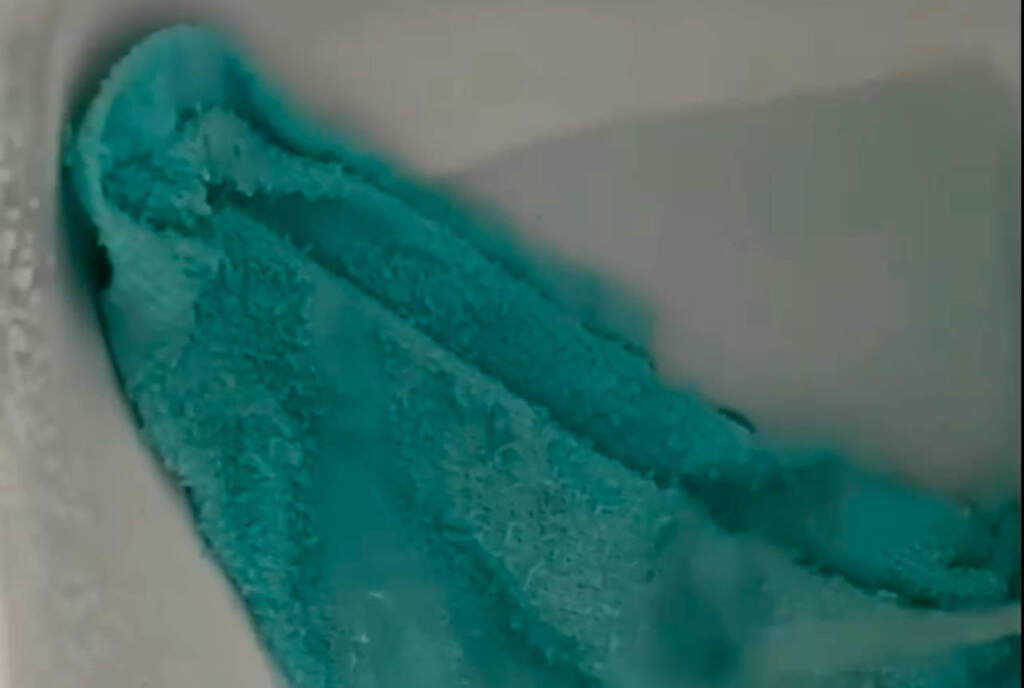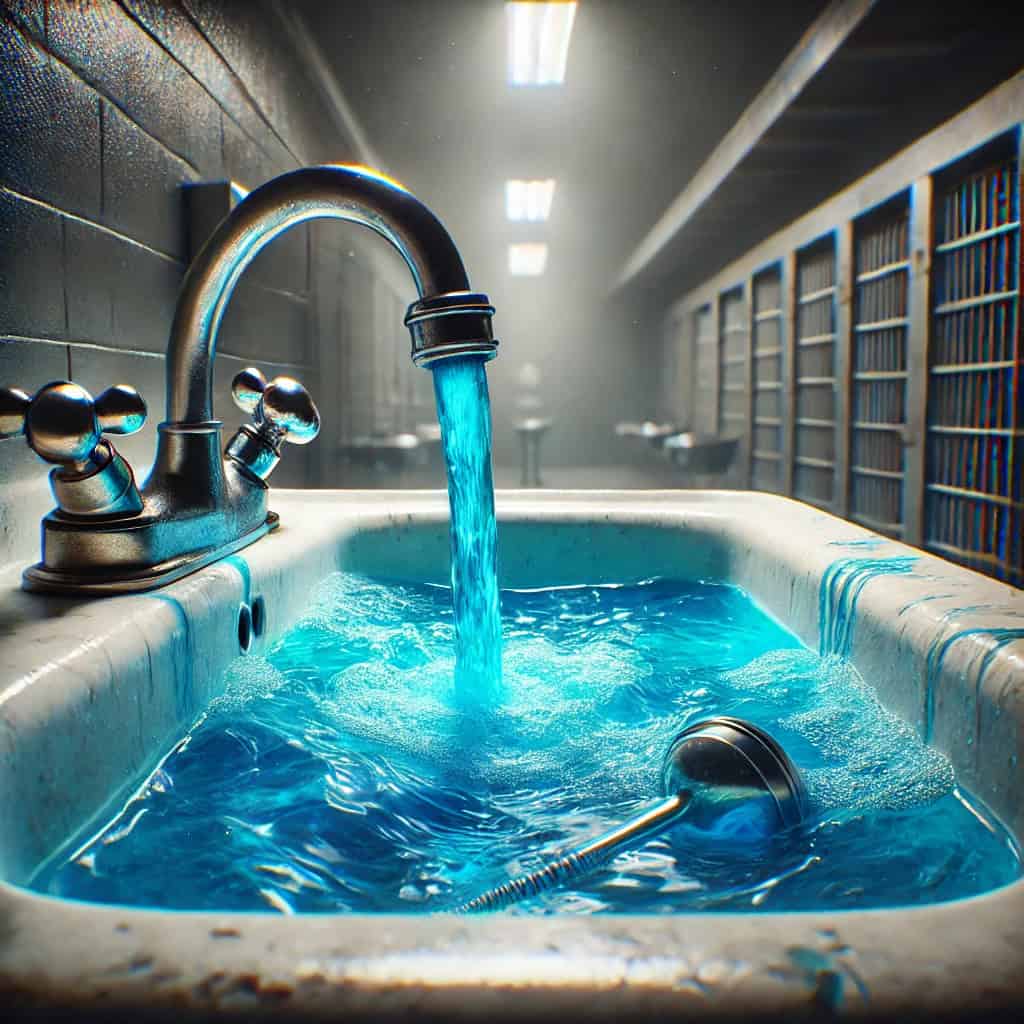The Unfolding Crisis
At Washington State Prison in Georgia, the water runs blue, but this isn’t a rare natural phenomenon—it’s a glaring symbol of neglect, and inmates are forced to use it for bathing and drinking despite warnings issued to staff to avoid it. Prisoners report rashes, stomach issues, and a growing sense of desperation, as the administration limits access to bottled water rather than addressing the root cause of the contamination.

The Georgia Department of Corrections (GDC) Commissioner dismissed concerns about the water as “just a rumor” during a Senate hearing. To date, no significant action has been taken to address the crisis. This disturbing situation mirrors a previous water contamination issue at Autry State Prison, where inmates were exposed to Legionella bacteria, resulting in a years-long closure for infrastructure upgrades.
Together, these cases highlight systemic neglect within Georgia’s prison system, where failing infrastructure and inadequate responses to health crises place incarcerated individuals’ lives in jeopardy.
A Troubling Precedent: Autry State Prison’s Water Crisis
In 2021, an inmate at Autry State Prison tested positive for Legionnaires’ disease, sparking an investigation that revealed Legionella bacteria in the facility’s water system. Legionnaires’ disease, a severe form of pneumonia, is caused by inhaling waterborne bacteria from contaminated sources. This revelation prompted the prison’s temporary closure in June 2023, with the GDC citing the need for extensive plumbing and HVAC upgrades. During this years-long shutdown, inmates were relocated, and taxpayers shouldered the cost of emergency repairs.
While the GDC attempted to spin the closure as proactive maintenance, the underlying reality was clear: the infrastructure failure could have been prevented with adequate oversight and routine inspections. The Autry incident set a troubling precedent for the neglect that would later unfold at Washington State Prison.
Blue Water at Washington State Prison
Fast forward to 2025, and the crisis has taken on a new, unsettling form. Videos and photographs from Washington State Prison show sinks and showers spewing water with a blue tint. The warden, Veronica Stewart, reportedly warned staff not to drink the water, yet prisoners were left with no alternative. Despite inmate complaints, the administration’s response has been to limit inmates to purchasing 12 bottles of water per week through commissary—an inadequate solution that forces inmates to either drink the blue water or face dehydration.
A video circulated among advocates clearly shows blue water coming from taps at Washington State Prison. The footage leaves little doubt about the reality of the situation, yet no action has been taken. Inmates and their loved ones have confirmed that the water has been in this condition for an extended period, and despite public awareness of the issue following the Senate hearing, the problem remains unaddressed.
Prison advocate Tiffany Johnson raised the issue during a December Senate hearing, only to be met with the GDC Commissioner’s dismissal of the reports as “just a rumor.” This cavalier attitude underscores the department’s failure to prioritize inmates’ health and safety.
Health Risks of Contaminated Water
Experts suggest that blue water is often caused by excessive copper levels, typically resulting from corroded pipes. Exposure to high levels of copper can lead to gastrointestinal distress, liver damage, and neurological issues. Inmates at Washington State Prison have reported skin rashes, stomach pain, and a pervasive sense of unease about the long-term effects of bathing in and drinking the water.
The lack of access to safe drinking water also places an undue burden on inmates’ families, who are forced to send money for bottled water through the commissary—a system notorious for its inflated prices and profit-driven motives.
Recurring Patterns: Profit Over People
The profit-driven nature of Georgia’s prison system exacerbates crises like those seen at Autry and Washington State Prisons. The root cause lies in decades of neglect and mismanagement, worsened by systemic corruption and the prioritization of profit over human rights. Most of Georgia’s prisons are over 30 years old and were constructed during eras of mass incarceration, but they have not been adequately maintained.
Instead of addressing the growing deterioration of these facilities, the Georgia Department of Corrections (GDC) has poured money into maintenance and infrastructure contracts that consistently fail to deliver results. Mismanagement and, in some cases, outright theft of funds have left these prisons in a state of disrepair. At Washington State Prison, prisoners are subjected to blue, potentially contaminated water. At Autry, Legionella bacteria in the water led to a year-long closure for emergency repairs. These incidents are not anomalies but part of a recurring pattern in which inmates suffer the consequences of administrative failure.
Our previous investigative reporting in Justice for Sale: The Ethics of America’s Prison System highlighted the extent of corruption within the GDC’s procurement processes. No-bid contracts, a lack of transparency, and allegations of kickbacks have created an environment where contractors profit without accountability, while the basic needs of inmates go unmet. Maintenance funds that could ensure safe living conditions are instead diverted to line the pockets of private contractors and complicit officials, perpetuating a cycle of neglect and exploitation.
This focus on profit over people has allowed infrastructure to crumble across Georgia’s correctional facilities. Plumbing systems are corroded, HVAC systems are outdated, and critical repairs are delayed for years. The result is prisons that are unsafe, unsanitary, and unfit for human habitation. Inmates, already stripped of their freedom, are further subjected to conditions that violate basic health and safety standards.
If Georgia’s prisons are to break free from this cycle of decline, the state must commit to transparency, accountability, and a complete overhaul of how prison funds are allocated and monitored. Without these changes, facilities like Washington and Autry will continue to deteriorate, with inmates paying the price for a system that values profit above all else.
Journalistic and Advocacy Challenges
While Tiffany Johnson and other advocates have worked tirelessly to bring attention to this issue, their efforts have been met with limited success. Ross Williams, a reporter for the Georgia Recorder, covered the Senate hearing where the blue water issue was mentioned but reportedly lacked the resources to pursue an in-depth investigation. This highlights the broader challenges faced by journalists and advocates trying to hold powerful institutions accountable.
Call to Action: Breaking the Cycle of Neglect
The recurring nature of water crises and deteriorating facilities in Georgia prisons demands immediate action:
• Independent Oversight: The GDC must be subject to regular, independent audits of its facilities and operations.
• Transparency: The department must publicly disclose findings related to water quality and infrastructure conditions.
• Investment in Infrastructure: State funds should be allocated toward long-term repairs and upgrades to prevent future crises, and use of these funds should be closely scrutinized.
• Accountability: The GDC leadership must be held accountable for its repeated failures to ensure the safety and well-being of incarcerated individuals.
You can make a difference, write your legislators to tell them what you think. You can utilize the Impact Justice AI system to write and send well crafted messages to decision makers and media in just minutes.
The blue water at Washington State Prison is not just a local crisis; it is a symptom of a broader, systemic problem within Georgia’s prison system. From Legionella bacteria at Autry to copper-contaminated water at Washington, these failures reveal a pattern of neglect, mismanagement, and disregard for human rights. Incarceration should not strip individuals of their dignity or subject them to conditions that endanger their lives. Georgia’s leaders must act now to break this cycle of exploitation and neglect, ensuring that prisons prioritize rehabilitation and humane treatment over profit and complacency.

3 thoughts on “Forced to Drink: Blue Water Scandal at Washington Prison”